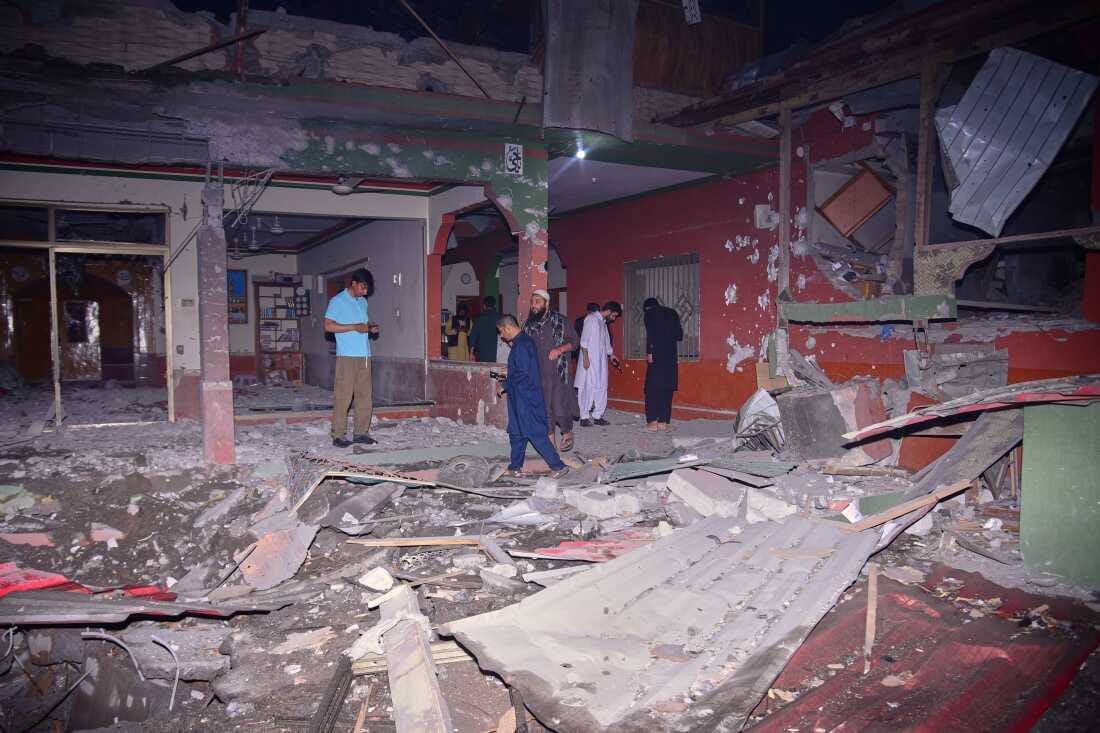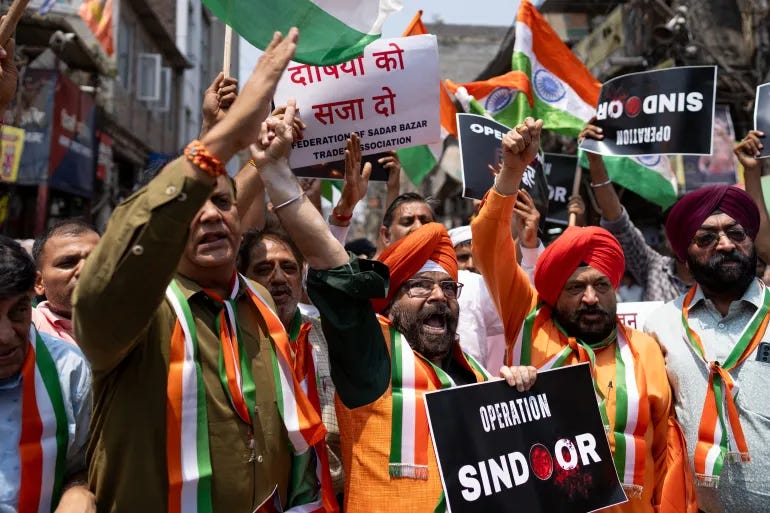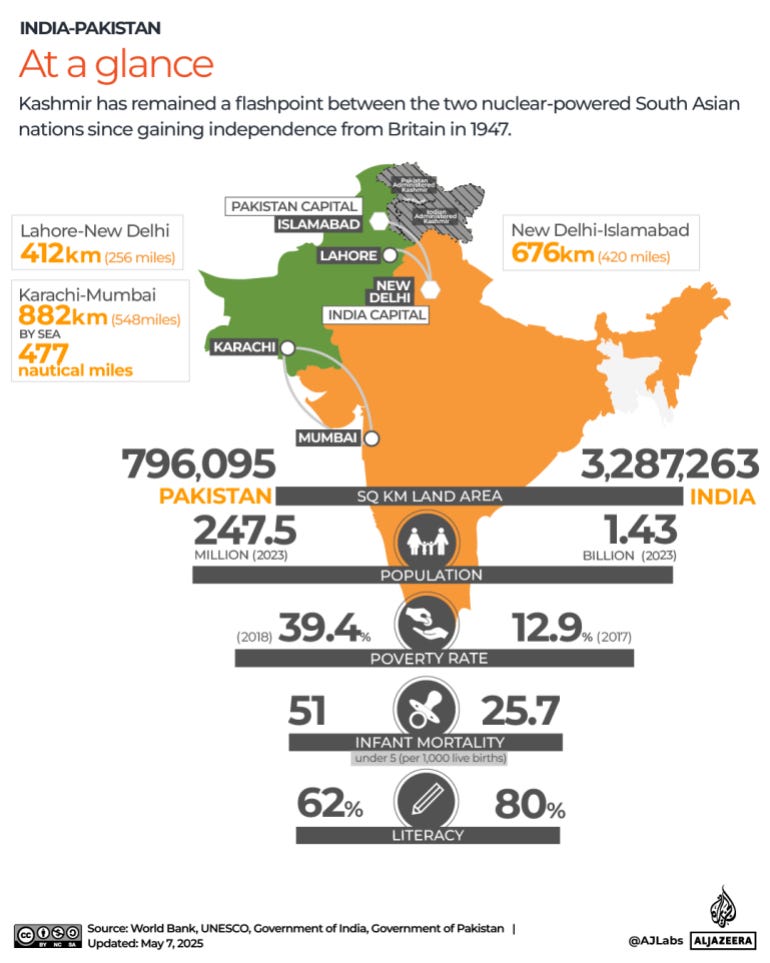From Gaza to Kashmir: The Globalization of Genocide
How India learned from Israel's assault on Gaza, and the world's silence, in their violence against Civilians in Kashmir and Pakistan.
As Israel's genocidal siege on Gaza continues, its horror is not just being televised — it's being studied. On May 6, the Indian government launched missile strikes into Pakistan, under the banner of “Operation Sindoor,” claiming it had targeted “terrorist infrastructure.” In reality, nine sites were bombed across Pakistan and Pakistan-administered Kashmir, including a mosque in Bahawalpur where a child and seven others were killed. Over 30 civilians were injured. No credible evidence was presented. No international inquiry was allowed. But the message was clear: India, like Israel, no longer feels bound by the rules of "law".
And why should it? The past 20 months have proven that war crimes can be livestreamed with no consequences. That entire families can be buried under rubble and still be framed as threats. That a genocide, if carried out in the name of "security", will not only be tolerated, but cheered on by allies.
The ideological kinship between Zionism and Hindutva has never been more deadly. Israel’s campaign of collective punishment in Gaza has offered a moral cover to Modi. It has shown that settler-colonial violence can be rebranded as national defense, that massacres can be justified by invocation of a vaguely defined “terrorist threat,” and that when the victims are Muslim, the international community will, at most, express “deep concern.”
What Israel does in Gaza, India refines in Kashmir.
This isn’t a metaphorical connection. India is one of Israel’s largest arms customers, purchasing surveillance drones, facial recognition software, and military equipment tested on Palestinians. Israeli spyware like Pegasus has been deployed in India against journalists, opposition figures, and Muslim activists. And the exchange isn’t limited to weapons. It’s a trade in tactics, in language, in impunity.
When Modi revoked Article 370 in 2019, stripping Jammu and Kashmir of its limited autonomy, he wasn’t improvising, he was following a settler-colonial playbook honed in the West Bank. Overnight, the region was flooded with Indian troops. Access to the internet was severed. Laws were amended to allow outsiders to settle in the region, altering its demographic fabric. Kashmiri journalists were jailed, their passports revoked. Protest was criminalized. Israel applauded.
In the years since, India has increasingly tested how far it can go. From bulldozer demolitions of Muslim homes in Uttar Pradesh, to the passage of the Citizenship Amendment Act, which fast-tracks citizenship for non-Muslim refugees, Modi’s government has made clear that Hindutva is not just a political ideology, it is a program of exclusion. And, increasingly, of extermination.
This week's missile strikes on Pakistan are not unprecedented. India has used the specter of cross-border terrorism to justify air raids in the past, notably in Balakot in 2019. But what makes this moment more dangerous is not just the brazenness of the attack, but the context in which it took place: a world already numbed by the normalization of mass violence.
India’s justification for the attack, the April 22 bombing in Pahalgam that killed 26 Hindu pilgrims, remains unproven. Pakistan condemned the attack and called for an international investigation. None came. No evidence has been produced linking the perpetrators to Pakistan. And yet, India acted unilaterally, killing civilians across an internationally recognized border. Why? Because it could.
The rhetorical template is identical to Israel’s: act first, justify later. Or don’t justify at all. The words “terrorist hideout” and “precision strike” have become talismans, magic phrases that absolve responsibility. The world hears them and turns the page.
This is how colonial violence adapts. It does not need to hide; it just needs better branding.
It is not just Palestine and Kashmir caught in the crosshairs. From Manipur to Assam, from Karnataka to Gujarat, India’s Muslim, Christian, Dalit, and Sikh communities have seen an escalation in state and vigilante violence. Churches burned. Hijabs banned. Homes bulldozed. The ideology of Hindutva demands not just loyalty, but purity — a national body cleansed of dissent and difference. Like Zionism, it cloaks its violence in civilizational rhetoric: we are not oppressors, we are the besieged.
It’s a lie, but a profitable one. Western leaders have little appetite for confronting it. The United States continues to deepen military ties with India, portraying it as a counterweight to China. Europe eyes India as a market too big to antagonize. And even as Pakistan buries its dead, the headlines in the West still ask whether India was “provoked.” The same script has played out in Gaza: mass death is recast as self-defense. Entire populations are treated as collectively guilty, and their grief, when expressed, becomes suspect.
But the costs are real. Kashmiris, as always, pay the highest price. Each Indian escalation tightens the noose: more raids, more curfews, more disappearances.
We have been here before. In Algeria, where the French claimed every bombed village was a rebel base. In Sri Lanka, where Tamil neighborhoods were shelled in the name of national unity. In Chechnya, where the Russian state flattened cities under the guise of “anti-terrorism.” And in Palestine, where every war crime is sold as preemption.
The lesson is always the same: when the international community fails to uphold law, it teaches others to break it.
Modi is watching Gaza. And he’s not just watching: he’s learning, copying, and testing. He has seen that a child’s death is only scandalous if the child is white. That entire cities can be erased if the press is on your side. That when the West says “never again,” it only means for some.
So today it was Bahawalpur. Tomorrow, it could be Lahore. Or somewhere else entirely. But the pattern is clear: the more we excuse genocide, the more we license it.
From Kashmir to Gaza, the struggle is not isolated. These are not regional conflicts. They are symptoms of a global architecture of impunity, one that must be named, dismantled, and resisted.







I would greatly appreciate everyone's thoughts and insight!
Yes.
Our response to the daily: maiming, killing, Starvation of 60k+ Palestinians and their infrastructure to rubble- serves as a labratory for authoritarian's worldwide.
That means You and Me, too.